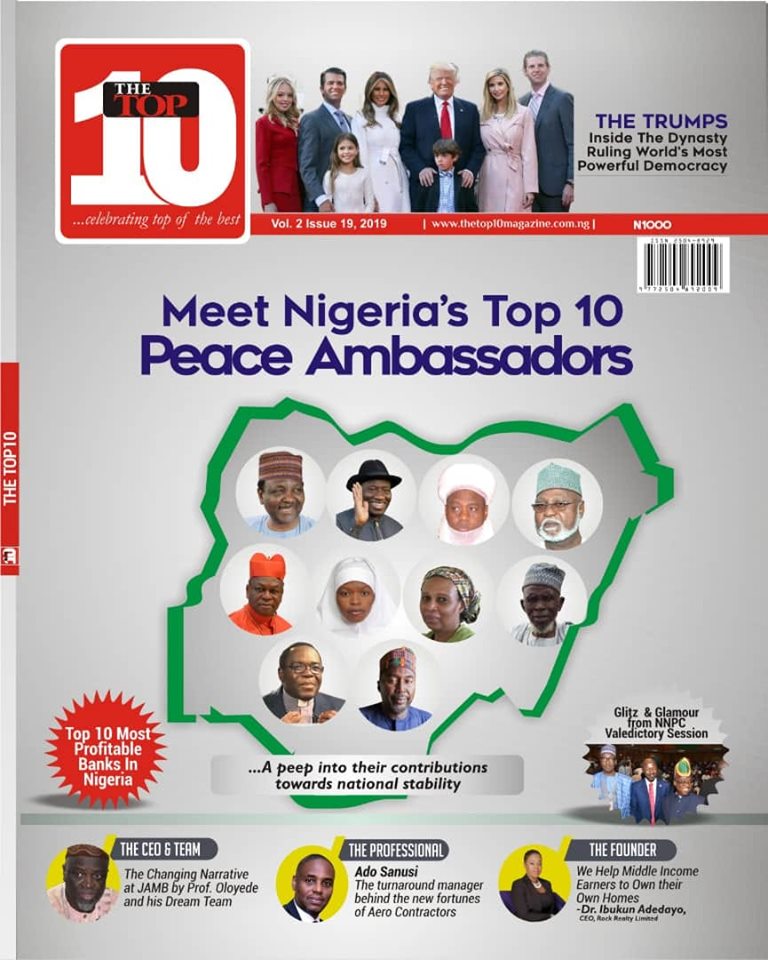Those who hold the light of peace in society do offer a concept for conflict resolution that violent responses to conflicts have failed to secure worldwide.Peacemakers have a message that national leaders often choose not to heed. They hold it an opinion, making it also their practice that the hope for sustainable peace lies in the effort to get warring parties to a round table rather than raising the budget for arms.
Nigeria, like other human societies, isfraught with conflicts, which have escalated lately from threats and agitations to yet unfolding versions of terrorism. Conflicts have reached the levels of destructive, fundamental and pivotal – the region at which national disintegration is known to happen.
Tempers are rising with poverty and growing insecurity is inducing uncertainty. The 2019 Global Peace Index (GPI) ranked Nigeria one of the least peaceful places on earth. Adding an increasing rate of suicide to prevailing banditry, economic stagnation, insurgency and kidnapping, GPI ranks Nigeria 148thout of 163 countries in the world on the level of peace.
According to the report, experiences of sadness, stress and worry are on the rise in Nigeria. Nigerians weren’t as angry in 2007 as they are today. Yet, even in 2007, late Nelson Mandela, former president of South Africa, could not understand why Nigerians weren’t angrier.
“Your leaders have no respect for their people. They believe that their personal interests are the interests of the people. They take people’s resources and turn them into personal wealth. There is a level of poverty in Nigeria that should be unacceptable”, he told Hakeem Baba Ahmed in an interview in 2007.
The job of peacemakers has never been as critical for the survival of the nation as it has become now. The men and women, who are letting in life-supporting oxygen of peace to a heating polity, hold the hopes for Nigeria’s survival as a nation. Their approach is to address the root causes of conflicts in the polity –fixing the historic wrongs and injustice that engender strife and conflicts.
Peacemaking is in essence conflict resolution – attained by developing constructive relationships across ethnic and national boundaries that redress injustice and change the structural conditions that generate deadly conflicts.Peacemakers are therefore drivers of the effort to build a pluralist democratic state in Nigeria where the rights of all citizens are respected. They seek to blend power with democratic principles,attach responsibility to authority and guard distribution of resources and opportunities with fairness.
The seed of development is seen to be in the hands of peacemakers, as they seek to dismantle the main obstacle to economic development and social progress: conflicts. Circumscribed by economic uncertainties, conflicts, terrorism, militancy, political instability and social upheavals, Nigeria’s growth and development functions have been severely undermined. Poverty has gone on rampage, fanning the fire of separatism.
Can a nation drive inclusive and sustainable development without peace was the concern of Prof. Bonny Ibhawoh, Professor, Centre for Peace Studies, McMaster University, Canada in his remarks at the 3rd Covenant University International Conference on African Development Issues at Covenant University, Ota, Nigeria in 2016.
“Unless there is sustainable peace, there can be no sustainable development. A country in a state of war or one that is crippled by political and social crisis, terrorism or militant insurgency cannot be in a position to put in place the necessary building blocks for development, even if the government and citizens have good ideas about how to do this”, he said.

He expects the government of Nigeria to give heightened attention to peacebuilding and conflict resolution. Any discussion about national development must begin with conflict prevention and resolution, proactive peacebuilding, defense of human rights and justice, he said.
Top 10 Magazine is leading the way to the heightened attention required for peace building by highlighting the great work being done by Nigeria’s peace ambassadors in this regard. The outlook may appear dark and gloomy but the nation is not without a beacon even in darkest times. This is what the peace ambassadors represent for the nation – that all hope is not lost and a new Nigeria is possible out of the ruling darkness.
Evil isn’t expected to triumph over good where good men and women refuse to sit down and do nothing. Nigeria is in a period when it has great need for its peace ambassadors to stand up and do more and when a lot more people need to hop into the peace making drive. It is a period in which the need is pressing for governments at all levels to incorporate peace building initiatives into their budget building endeavours.
Hundreds of billions of naira budget vote isn’t likely to bring about infrastructural development if construction companies have to abandonthe projects due to insecurity. Budget programmes for promoting agriculture aren’t expected to yield the desired fruits in the environment of conflict between cattle herders and farmers in various parts of the country.
No society has succeeded in attaining sustainable peace by suppressing the oppressed, but that is usually what violent official responses target to achievein conflicts. Peacemakers seek to trace conflictsto their roots and to address them from there to the surface. Prof. Benjamin Osisioma, of the NnamdiAzikiwe University, Awkaconsiders as key the resolution technique being applied to conflicts.
In a paper presented at the NIM south-east zonal summit in 2016, he said thatconflicts can serve a constructive role leading to a re-examination of basic assumptions and practices. “The challenge for leaders and managers is how to make conflicts constructive rather than destructive, overt rather than covert, marginal rather than fundamental, peripheral rather than pivotal”.
Peacemaking is viewed as a practical step to transform conflict by establishing equitable power relationships sufficiently encompassing to forestall future conflicts.By establishing the means of agreeing on disputed issues among parties, peacemaking seeks to achieve full reconciliation among contenders and stakeholders. It does so by seeking the satisfaction of all parties involved in the conflict. This is in contrast to violent responses, which aim at attaining victory for one or more but not all parties involved.
Sustainable peace is recognized as an important factor for today’s development and future prosperity. Giving it priority means that actors do not seek self or sectional wellbeing– which would violate the stable state of peace.
In the process of this work, Top 10 Magazine reviewed a long list of distinguished patriots who stand out as true peace ambassadors of Nigeria. They take the credit for missions andinitiatives at critical timesthat have ensured the continuing co-existence of Nigerian people as a nation.
The long list was narrowed down to 10 most outstanding personalities, using the criterion of national impact of their initiatives and actions. Top 10 Magazine considers their recognition in this edition as a great honour to the rest of the peace ambassadors, who couldn’t make it to the top 10.






